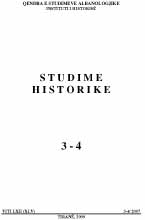Politika e bashkësisë ndërkombëtare në Kosovë në vitet nëntëdhjetë
The policy of the international community in Kosova during the 90s
Author(s): Jens ReuterSubject(s): History
Published by: Qendra e Studimeve Albanologjike
Keywords: policy of the international community ; Kosova ; 90s; Albania; Albanian History;
Summary/Abstract: In his study the German scholar Jens Reuter basing on the situation in former Yugoslavia, in the beginning of the 90-ies, puts in evidence that the International Community, USA and EU didn’t value as much as was needed the fact that Milosheviç removed to Kosova and Vojvodina the autonomy, excluding them from rights given them by the Federative Constitution of the year 1974. Thus, passed over in silence this conspiracy with the idea that, allegedly, Kosova was considered as part of Serbia. This was also for the fact that it was considered as excessive to require from the Serbs to secure Kosova, and in addition to Kosova Bosnia, too. The Republic of Kosova of the year 1991 was recognized only by the parliament of Tirana, while the Declaration of Edinburgh (December 1992) requested to be reestablished the “autonomy of Kosova inside Serbia” which presupposed that every thing could be resolved with “dialogue” and “measures creating confidence”. The European Union after the year 1992 was interested in the restraint of violence in Kosova, that’s why the non-violent policy of Ibrahim Rugova found moral support in the western world. This policy held for over 7 years calm a region which always was qualified as centre of war. The efforts of the Albanians and of I. Rugova didn’t achieve to internationalize the question of self-determination to such a degree that “Kosova – the foundling of Dayton” was not accepted neither in the Conference of Dayton in the year 1995. Afterwards, all the efforts aimed at the improvement of the man’s rights in Kosova, which were violated continually by Belgrade and which much scruple. Taking all that in consideration, the European Council addressed with an appeal to Belgrade asking for Kosova a “dimension of autonomy” without making any change in the territorial Status quo in the remained Yugoslavia. According to the author, this request would lead to the situation when, after the fulfilling of this request by Belgrade, Kosova would be called part of Yugoslavia, and the solution of the problems with it would be an inner question of Yugoslavia. And every request of the international factor would be called intervention in the inner affairs. The author mentions a very important fact: the Albanians considered the Serb army and police as occupier and their country as occupied zone. In these conditions the stands were diametrically opposed.
Journal: Studime Historike
- Issue Year: 2007
- Issue No: 03-04
- Page Range: 113-134
- Page Count: 22
- Language: Albanian
- Content File-PDF

